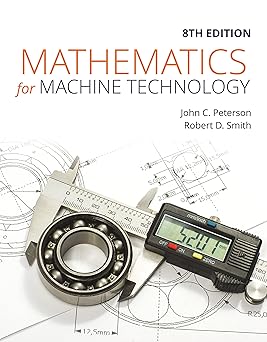Mathematics for Machine Technology 8th Edition
by John C. Peterson, Robert D. Smith
Key Highlights
- •Updated 8th Edition reflecting current industry practices.
- •Focuses on practical application with real-world shop examples.
- •Comprehensive coverage from basic arithmetic to geometry and trigonometry for machining.
Description
Ready to master the math behind the machines? Dive into Mathematics for Machine Technology 8th Edition! This book is your essential guide to understanding and applying the mathematical concepts crucial for success in today's machine technology field. Forget dry, abstract theories – this book make math practical and relevant to the shop floor.
Who is this book for? It's specifically designed for machine technology students, apprentices begining their journey, seasoned machinists looking for a refresher, and anyone enrolled in a technical or trade school program focused on machining. If you work with lathes, mills, or CNC machines, this book is definately for you.
What problem does this book solve? Many students and professionals find applying math concepts to real-world machining tasks challenging. Maybe you struggle with calculating speeds and feeds, understanding geometric dimensioning, or figuring out trigonometry for complex angles? This book bridges that gap, taking mathematical principles and showing you exactly how they're used in day-to-day machining operations. It helps build confidence and reduce errors caused by miscalculations.
What will you gain from reading it? You'll develop a strong foundation in essential shop mathematics, from basic arithmetic and algebra to geometry and trigonometry, all tailored for machine technology. You'll learn how to solve practical problems related to measurements, tolerances, thread calculations, gear ratios, and CNC programming setups. Ultimately, you gain the skills to work more accurately, efficiently, and independently.
Why is it worth reading? Now in its 8th edition, this text is refined and updated to reflect current industry practices. Authors John C. Peterson and Robert D. Smith present concepts clearly, using step-by-step examples and illustrations drawn directly from the machine shop enviroment. It’s not just about what the math is, but how and why you use it in your trade. Its a highly reccomended resource for building the core math skills needed in modern manufacturing. Get your PDF copy today and start sharpning your essential machining math skills!
FAQ
Is this book just theory, or does it have practical examples?
It heavily focuses on practical application! The book is packed with real-world examples and problems drawn directly from machine shop scenarios, helping you connect math concepts to actual machining tasks.
What specific math topics are covered?
It covers a wide range, starting with basic arithmetic, fractions, and decimals, then moving into algebra, geometry (including GD&T concepts), trigonometry, and specific shop calculations like speeds/feeds, tapers, and threads.
Do I need strong math skills before using this book?
The book starts with fundamental concepts, making it accessible even if your math skills are a bit rusty. It builds up progressively, so while some basic understanding helps, it's designed to guide you through.
Is this book helpful for learning CNC programming math?
Yes, it includes sections on the mathematical calculations needed for CNC setups and operations, particularly involving geometry and trigonometry for tool paths and coordinate systems.
Can I use this textbook for self-study?
Absolutly! The clear explanations, step-by-step examples, and practical focus make it suitable for self-paced learning, whether you're an apprentice, a hobbyist, or a professional looking to brush up your skills.
Reader Reviews
About the Author
John C. Peterson and Robert D. Smith are experienced educators with extensive backgrounds in technical and vocational training, particularly in machine technology. Their work focuses on making complex mathematical concepts accessible and directly applicable for students and professionals working in the machining and manufacturing industries, ensuring learners gain practical, job-ready skills.
